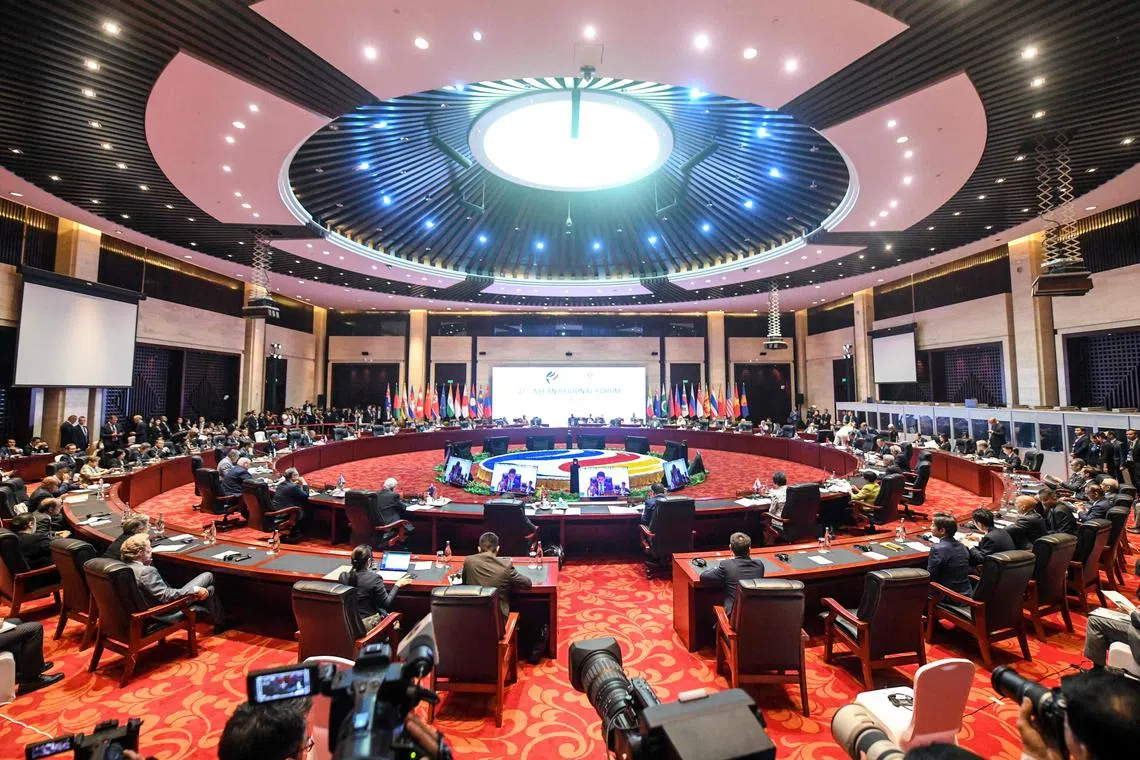Asean region needs to be an oasis of peace in a troubled world: Vivian
Sign up now: Get insights on Asia's fast-moving developments

The talks in Laos involved top diplomats from Asean’s dialogue partners, including the United States, China, Russia and the European Union.
PHOTO: AFP
Follow topic:
VIENTIANE, Laos - With wars raging in Ukraine and Gaza, and the geopolitical contest between Beijing and Washington raising temperatures, Asean’s main challenge is “not to fall into the strategic traps that have occurred in other parts of the world” and to keep South-east Asia an oasis of peace, said Singapore’s Foreign Minister Vivian Balakrishnan on July 27.
“The key strategic challenge for Asean in such an unsettled world: Remain united, remain coherent, focus on economics and not fall into the problems, the very severe, fundamental problems which have beset Europe and the Middle East. Too early to say that we’re completely out of danger,” he told reporters in Vientiane after the closing of the Asean foreign ministers’ meetings there.
The talks in Laos involved top diplomats from Asean’s dialogue partners, including the United States, China, Russia and the European Union, which brought discussion of these distant wars to the region’s doorstep. The EU’s high representative for foreign affairs and security policy Josep Borrell, for one, appealed to his Asean counterparts for understanding on July 26 about Russia’s invasion of Ukraine, saying “the Ukrainian struggle is existential for us”.
Israel’s bombardment of Gaza since the Oct 7, 2023, terrorist attacks by Palestinian group Hamas also received close attention from Asean’s foreign ministers.
In a joint communique released on July 27 sharing their points of agreement on that and other subjects, the ministers expressed “grave concern over the dire humanitarian situation” in Gaza and “condemned all attacks against civilians and civilian infrastructure”.
They also acknowledged the July 19 advisory opinion issued by the International Court of Justice that the United Nations should consider further action “required to bring to an end as rapidly as possible the unlawful presence of the State of Israel in the Occupied Palestinian Territory”.
Dr Balakrishnan said: “My own view is that the situation with the Middle East continues to have a significant risk of escalation. And if you add the situation in Europe and the Middle East and the fact that it’s the same cast of states on opposing sides in both those arenas, it is a cause for concern.”
“But the point is South-east Asia – assuming we can maintain ourselves as an oasis of peace, stability and security – in fact, it’s got good prospects, good economic prospects, and that’s what we want to focus on,” he added.
Closer to home, the deepening crisis in Myanmar triggered by the 2021 military coup continued to feature in discussions in Laos. Through the joint communique, the foreign ministers expressed their “deep concern” and “strongly condemned the continued acts of violence against civilians and public facilities and called for immediate cessation”.
Asean’s road map to peace, which has seen little progress amid the intensifying civil war there, would remain its “main reference” in trying to address Myanmar’s crisis, according to the document.
In his remarks to reporters, Dr Balakrishnan warned against external interference in Myanmar, and reiterated the need for “strategic patience” in the light of the complexity of the situation.
“Myanmar is a unique, complicated place,” he said, adding that external interference only complicates matters.
While external parties can provide humanitarian aid, tasks like national reconciliation, the release of political prisoners and real dialogue “need to be done within Myanmar”, he said.
“We need to be very careful,” he said. “For us in Singapore, we have conveyed to all the sides that we think this current arrangement with a military government is a dead end. It’s not going to achieve national reconciliation.”
Pointing out that the Myanmar military was not in control of large parts of the country as well as its borders, he said “the current arrangements are not tenable”.
But he warned that there was no quick and easy solution.
Singapore has kept lines of communication open to all Myanmar stakeholders about where it can help “at the right time, right place (and with the) right sequence of actions”, he said.
Meanwhile, tensions in the South China Sea between rival claimants China and the Philippines appeared to have eased somewhat after Manila on July 27 managed to resupply troops
Still, with China claiming almost the entire strategic waterway – pitting it against Vietnam, Malaysia and Brunei as well – these conflicts are not expected to go away.
On this front, the joint communique urged “self-restraint in the conduct of activities that would complicate or escalate disputes”.
Asean and China have been negotiating a code of conduct in the South China Sea since 2018.
Dr Balakrishnan said the negotiations have not been easy but Asean cannot afford to stop, considering its interest in maintaining peace and stability.


